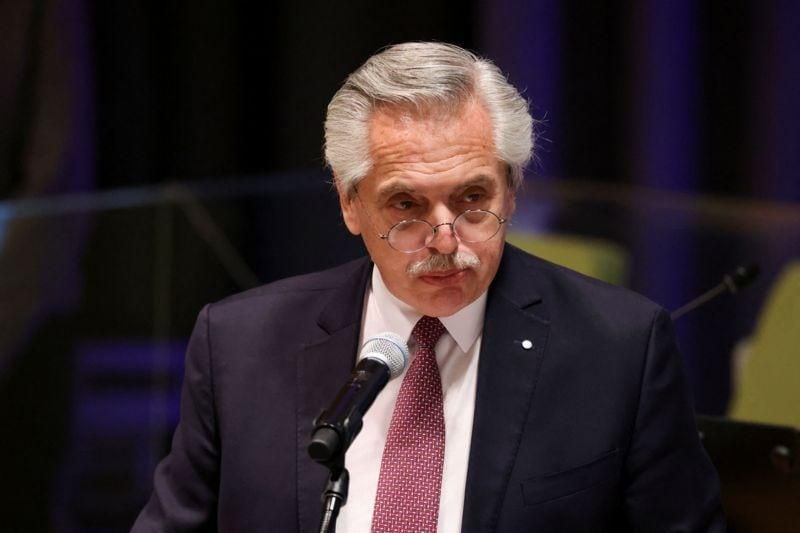At the end of your trip to China in June, Sergio Massathe Argentine economy minister and presidential candidate, joked that his country should be renamed “Argentina”.
“We are going to found the republic of Argentina,” he told reporters in Beijing, after being promised a new round of multibillion-dollar investments.
LOOK: “They are here, they will kill us in a minute”: the horror of the Hamas attack captured in a WhatsApp group of kibbutz mothers
But, as the saying goes, every joke has some truth.
The numbers don’t lie: ties between the southern country and China have strengthened significantly, to the point that Argentina displaced Brazil as the main destination for Chinese investments in Latin America last year.
In 2022, according to the study by the Brazil China Business Council (CEBC) “Chinese investments in Brazil: 2022 – technological and energy transition”, the amount allocated by China to Argentina was US$1.34 billion, compared to US$1. 3 billion received by China. Brazil. .
More recently, following Chinese support, Argentina was announced as one of the six countries that will join the BRICS from 2024, a group formed by Brazil, Russia, China, India and South Africa.
The other countries included are Saudi Arabia, Egypt, United Arab Emirates, Ethiopia and Iran.
Furthermore, since last year, Argentina has been part of the so-called “New Silk Road”, a Chinese development project and was the first major economy in Latin America to join this initiative.
Even with the possible victory of libertarian Javier Milei, the best positioned presidential candidate in voting intention polls and who has openly criticized China, they consider a rupture between Argentina and the Asian country unlikely.
The first round of the Argentine presidential elections will take place next Sunday, October 22, with Sergio Massa (Unión por la Patria), the government candidate; Patricia Bullrich (Together for Change) and Javier Milei (La Libertad Avanza) from the opposition, as favorites in the race.
However, experts consulted by BBC Brasil believe that last year was an isolated case and that Brazil, which has historically received almost half of Chinese investment in Latin America, will regain leadership.
Dependency
China is Argentina’s second most important trading partner, after Brazil. 30 years ago, in 1992, it occupied 14th position.
The reasons for the close relationship between the two countries are diverse and some of them also explain Chinese interest in Brazil.
On the one hand, both Argentina and Brazil are exporters of raw materials – with Argentina being an agricultural powerhouse – with products such as meat, wheat, corn and soy, as well as mineral resources such as oil, gas and lithium.
On the other hand, China, with a population of more than 1.4 billion people and a large appetite, needs these raw materials for its development and growth.
“China will always have to import large quantities of food because its agricultural resources are not sufficient. In this sense, Argentina, with its immense rural wealth, is an obvious partner”, says Jorge Heine, former Minister of National Assets of Chile and former Ambassador of Chile in Beijing, currently a professor at Boston University, United States.
The historic scarcity of dollars in Argentina, mainly due to the high external debt accumulated during its various crises, increased this dependence.
“Argentina today does not have many options that do not involve China, this is an undeniable reality. With the United States and Western banks at risk of default; Europe is increasingly distant from the region; “Russia, which could take advantage of this vacuum, is facing its own crises due to the war in Ukraine”, says Tulio Cariello, Director of Content and Research at CEBC.
“The only country with the scale to establish a more comfortable partnership with Argentina is China.”
In June, Argentina signed an agreement with the People’s Bank of China (central bank) to expand the to replace of foreign exchange, which amounts to a total of 19 billion dollars.
This allowed the Latin American country to pay part of its debt with the International Monetary Fund (IMF) in yuan, having access to less than a third of these resources, together with a disbursement from the Development Bank of Latin America and the Caribbean (CAF). . ).
Deep down, there is also the geopolitical issue: China has been increasing its influence in Latin America, a region that has long been considered the “backyard” of its main rival in the international geopolitical chessboard: the United States.
“China has a long-term vision for its investments and, in this sense, problems or setbacks in the Argentine economy are less of an obstacle for it than for Western companies”, explains Jorge Heine.
Furthermore, according to him, “the US economy competes with the Argentine economy: the United States produces meat and soy, for example. There are more elements of complementarity between the Chinese and Argentine economies, which explains this fruitful association,” he adds.
According to a high-ranking source in the Argentine government, who spoke to BBC Brasil on condition of anonymity, China “has been Argentina’s main financial ally in recent times and President Alberto Fernández is grateful to the Chinese government”.
“For this reason, his last international trip was to China, a gesture of presidential diplomacy, after the renewal of the to replace of coins.”
Alberto Fernández arrived in China last Saturday, October 14, to meet with former Brazilian president Dilma Rousseff, president of the New Development Bank (also known as the “BRICS Bank”), in Shanghai, and with the Chinese president , Xi Jinping, in Beijing.
Fernández participates in the third Belt and Road Forum for International Cooperation and also meets with investors.

Brazil
Although Argentina surpassed Brazil in investment volume last year, experts consulted by BBC Brasil do not believe this will become a trend.
“I think the idea that Argentina surpassed Brazil must be contextualized. The difference between the two in 2022 is very small, not even 500 million dollars”, says Tulio Cariello, from CEBC.
“Furthermore, in historical terms, Brazil has almost always led, with some countries in the region surpassing it at specific moments. Chile, for example, was ahead of Brazil due to massive investment in the lithium sector”,
Jorge Heine of Boston University agrees.
“I consider what happened last year more of a coincidence than anything else. There are several Chinese projects under development in Brazil. Therefore, what happens in one year does not necessarily become a trend”, he highlights.
Unspecified investments

According to the CEBC report, last year, one of the reasons that helped Argentina surpass Brazil in terms of Chinese investments was the prominence of the lithium exploration business in the mining industry.
There were two significant acquisitions in the exploration of this mineral by Chinese companies Ganfeng Lithium and Zijin Mining Group.
However, experts point out that, as in Brazil, many of the announcements of multibillion-dollar Chinese investments in Argentina have not yet materialized.
“For more than 15 years, China has been announcing investments in Argentina that in most cases have not materialized significantly. What has been happening lately are some specific investments”, says Marcelo Elizondo, economist and president of the Argentine Committee of the International Chamber of Commerce (ICC).
In his opinion, “Argentina is not very attractive for Chinese investors, who have encountered numerous obstacles”.
It mentions the “exchange gap” (differences between the official exchange rate and the multiple parallel quotations of the dollar), added to the difficulties in importing inputs and machines for production.
“In this sense, China has been more present due to Argentina’s financial needs and urgent circumstances, such as payments to the IMF”, adds Elizondo.
Changing course with Milei?

What could happen in Argentina if the most favored candidate for president, the libertarian Javier Milei, wins the elections?
Called “the Argentine Trump”, Milei has suggested “breaking relations with China” due to the knowledge that the Asian country is governed by the Communist Party and seeks to bring Argentina closer to the United States, which is currently the third most important commercial partner from Argentina.
He also promised, if elected, to withdraw Argentina from Mercosur and described President Luiz Inácio Lula da Silva as a “socialist with a totalitarian vocation”.
“This separation [de Argentina con China] that would be impossible. China is the main destination for our beef and soybean exports. It is not possible to stop trading with China. You can’t ideologize foreign trade, that’s impossible”, says Diego Guelar, former Argentine ambassador to Brazil.
The Argentine ambassador to Switzerland, Gustavo Martínez Pandiani, considered a possible chancellor in a possible Sergio Massa government, believes that “China is today one of the most important emerging economies in the world and has become a relevant investor in Latin America”.
“We believe that we must continue to strengthen the strategic partnership with China with the aim of advancing the development of key sectors such as agribusiness and energy, among others”.
Jorge Heine, from Boston University, recalls that former president Jair Bolsonaro also used anti-China rhetoric during the presidential campaign, but under his government trade relations between the two countries were not harmed.
“My assumption is that Milei, if elected, would have to do the same thing that Bolsonaro did: swallow his words and do what the imperatives of international economic realities impose on him,” he states.
Despite this, Ariel González Levaggi, executive secretary of the Center for International Studies at the Argentine Catholic University, does not rule out friction between Argentina and China in the event of Milei’s victory.
“These elections are not good news for the Chinese, as the three candidates have presented much less pro-China agendas.”
“However, in the case of Milei, the concern is great, especially with regard to strengthening relations, with the fear that some investment projects will be paralyzed”, he highlights.
González Levaggi concludes: “In any case, it is unlikely that bilateral relations will return to the level of Cristina Kirchner’s presidency (2007-2015), especially in her second term, when there was a rapprochement between the two countries and Argentina had a situation very reluctant position towards the United States”.
This article was originally published in Portuguese by BBC News Brasil. Read by doing Click here.
Source: Elcomercio
I am Jack Morton and I work in 24 News Recorder. I mostly cover world news and I have also authored 24 news recorder. I find this work highly interesting and it allows me to keep up with current events happening around the world.

:quality(75)/cloudfront-us-east-1.images.arcpublishing.com/elcomercio/QAD7DMP435FEZCEWWCD45MZP7E.jpg)

:quality(75)/cloudfront-us-east-1.images.arcpublishing.com/elcomercio/GIYTANJNGEZC2MJQKQYDAORSGE.jpg)
:quality(75)/cloudfront-us-east-1.images.arcpublishing.com/elcomercio/527CU7W57JGXBBFW2KP2OXLAYU.jpg)

:quality(75)/cloudfront-us-east-1.images.arcpublishing.com/elcomercio/7ODFOJJP25A25KGMCRUMUKPBAY.png)
